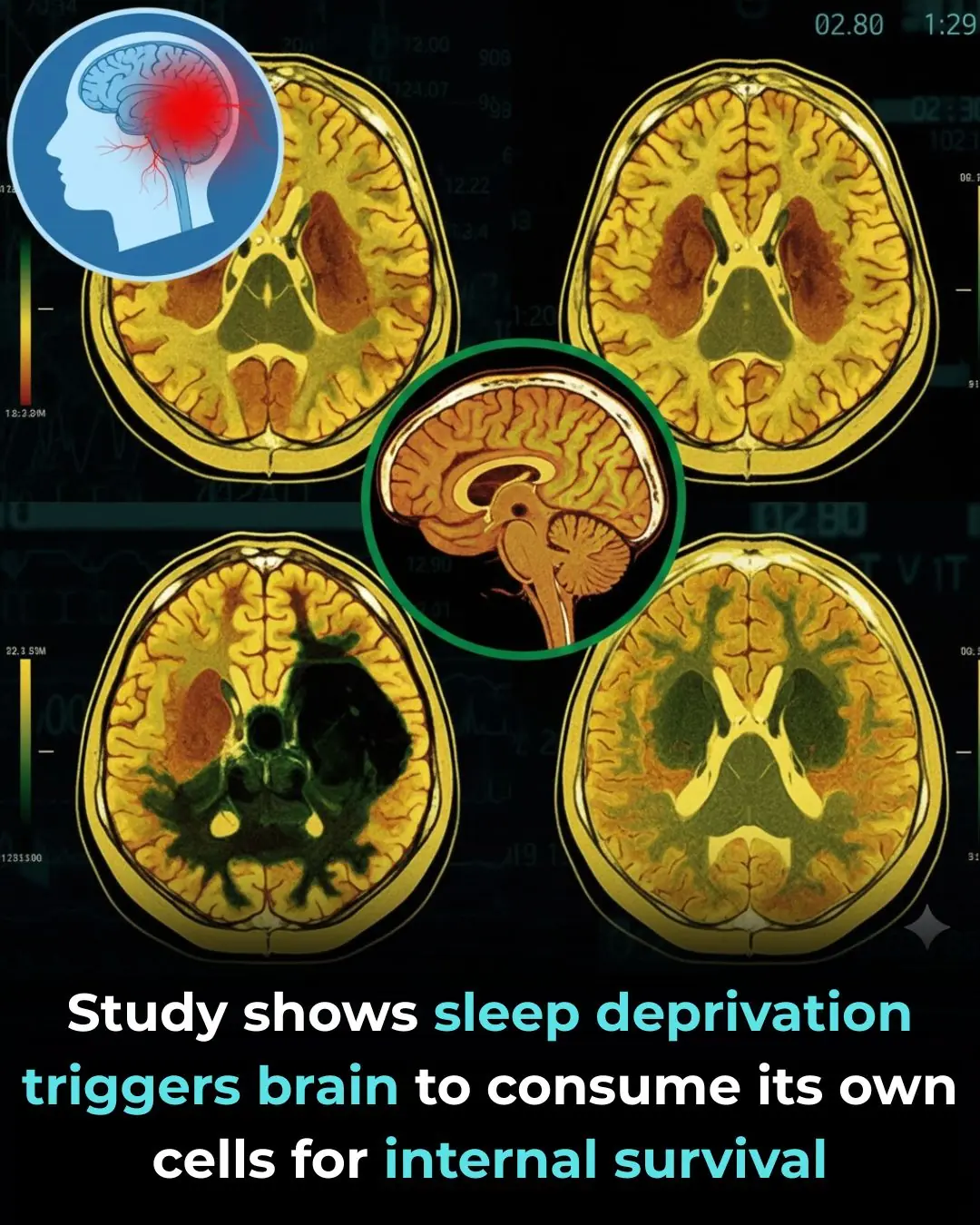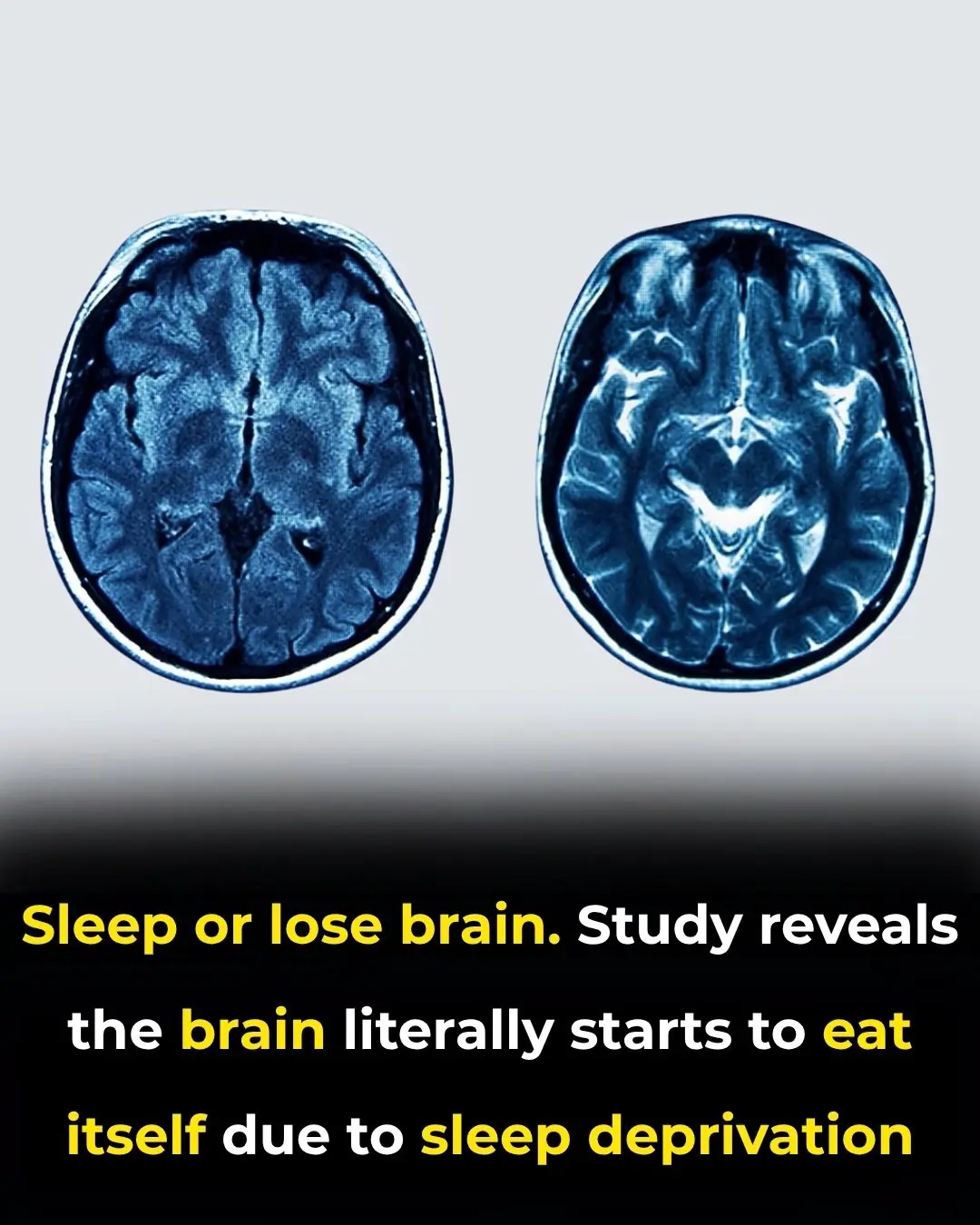
When the Brain Eats Itself: The Hidden Damage Caused by Lack of Sleep

Sleep is often described as a time of rest, but modern neuroscience paints a far more critical picture: sleep is the brain’s most essential repair cycle. Without it, the brain doesn’t simply run low on energy — it begins to consume itself.
A recently discussed study has revealed a disturbing phenomenon: during prolonged sleep deprivation, the brain activates cellular processes that break down healthy connections, almost as if it were cannibalizing its own structure to survive. The findings have transformed the way scientists understand chronic sleep loss and its consequences on long-term brain health.
The Brain’s Cleanup Crew Turns Destructive
Under normal conditions, two types of brain support cells — astrocytes and microglia — work quietly and efficiently behind the scenes.
-
Astrocytes prune unnecessary synapses, clearing out waste produced during daily mental activity.
-
Microglia act as the brain’s immune system, removing damaged cells and protecting against infection.
Both of these processes are vital for learning, memory, and healthy neural communication. But when sleep is reduced or consistently interrupted, something alarming happens:
these cells become overactive and begin consuming healthy brain tissue.
Researchers observed that in sleep-deprived animals:
-
Astrocytes increased their pruning activity dramatically
-
Microglia began engulfing not only debris, but also functional synapses — the very structures that allow neurons to communicate
This means that chronic sleep loss triggers the same destructive immune-like activity seen in neurodegenerative diseases.
Why Would the Brain Destroy Itself?
Scientists believe the brain may be attempting to compensate for overload. Without sufficient sleep, neurons accumulate stress, metabolic waste builds up, and synapses become overworked. The brain may interpret this chronic strain as damage, prompting the cleanup system to go into overdrive.
But this comes at a high cost.
The over-pruning of synapses weakens the neural networks responsible for:
-
Learning
-
Memory
-
Emotional stability
-
Focus and attention
-
Decision-making
-
Stress regulation
What begins as an adaptive response quickly becomes harmful — essentially transforming the brain’s maintenance system into a self-destruct mechanism.
The Silent Damage You Don’t Feel Happening
One of the most troubling aspects of this discovery is how invisible the damage is. You can feel tired, irritable, or foggy after a poor night of sleep, but the deeper effects — synaptic loss, cellular inflammation, and structural decline — are silent. You won’t feel your brain breaking down.
But over time, the symptoms become undeniable:
-
Reduced memory recall
-
Slower processing speed
-
Mood swings and irritability
-
Poor stress tolerance
-
Brain fog and disorientation
-
Weakened cognitive resilience
By the time these signs appear, the underlying neural damage has often already begun.
A Path Toward Long-Term Disease
The same microglial activation triggered by sleep loss is heavily involved in the early stages of neurological conditions such as:
-
Alzheimer’s disease
-
Dementia
-
Parkinson’s disease
-
Other disorders marked by chronic inflammation and neural decline
This means that chronic sleep deprivation doesn’t just make you tired — it may be quietly raising your risk of long-term cognitive deterioration.
Even a Few Nights Can Trigger the Effect
Perhaps the most shocking detail is that even short-term sleep loss can initiate the brain’s “cleanup response.” While a single night doesn’t cause permanent damage, several nights of insufficient rest — a common reality for many adults — are enough to activate overactive astrocytes and microglia.
If the pattern continues, the damage accumulates.
Sleep Is Not Optional — It Is the Brain’s Lifeline
No supplement, caffeine boost, or productivity hack can replace the neurological repair that happens during deep sleep.
-
Synapses reset
-
Hormones rebalance
-
Toxins clear
-
Neurons repair
-
Memory consolidates
-
Emotional circuits stabilize
Sleep is the brain’s only chance to recalibrate and rebuild.
The message is unmistakable:
Protect your sleep as if your brain depends on it — because it does.
Your mind, your memory, your mood, and your long-term health are shaped every night by how well you sleep. The cost of ignoring this is far greater than feeling tired. It is the quiet erosion of the very organ that makes you who you are.
News in the same category


Controversial I'm A Celeb star Ruby Wax's changing face

MAFS UK's Abi issues emotional relationship status update

Ant McPartlin's tattoos explained – from meaningful inking to poignant tribute

Kerry Katona undergoes corrective boob surgery as she gushes over beau Paolo's support

How Rose Essential Oil May Reshape the Brain: A Deep Dive Into a Surprising New Study

Celebrity MasterChef’s Gaz Choudhry fails to impress Grace Dent and John Torode and is sent home

DANIEL RADCLIFFE SENDS LETTER TO NEXT HARRY POTTER AND RECEIVES AN INCREDIBLY HEARTWARMING REPLY

I’m A Celebrity 2025: What the meaning is behing Shona McGarty’s piercings and tattoos

HOW CANCER CAN CAUSE DYSLEXIA AS MARTIN KEMP OPENS UP ABOUT EXPERIENCE ON I'M A CELEB

BILLY BOB THORNTON REVEALS TRUTH ABOUT INFAMOUS BLOOD VIALS WITH ANGELINA JOLIE

Complaints pour in as I’m A Celebrity viewers fume at Kelly Brook’s comments to Jack Osbourne

Katie Price Reignites Tensions Over Daughter Princess Andre, Urges Teen to “Tell the Truth”

Coronation Street: Megan’s Grooming of Will Deepens as Actress Beth Nixon Reveals Troubled Backstory

Heartfelt meaning behind Jack Osbourne’s smiley face knee tattoos revealed

Gogglebox Star Steve Sheehan Playfully Warned by Wife Sue: “Be Careful on the Train!”

Deal or No Deal Contestant Ush Opens Up About Emotional Journey to Motherhood

I’m A Celebrity 2025: Aitch Handed Crucial Career Warning Ahead of Jungle Debut
News Post

Ariana Grande gives shocking update on music career after ‘Wicked: For Good’

Controversial I'm A Celeb star Ruby Wax's changing face

MAFS UK's Abi issues emotional relationship status update

The “Hand of God” Technique: How a Simple Gesture Brought Humanity Back Into Isolated Hospital Rooms

Ant McPartlin's tattoos explained – from meaningful inking to poignant tribute

When the Brain Begins to Consume Itself: The Hidden Costs of Chronic Sleep Loss

From Self-Marriage to Self-Divorce: Suellen Carey’s Viral Journey of Self-Love

Kerry Katona undergoes corrective boob surgery as she gushes over beau Paolo's support

How Rose Essential Oil May Reshape the Brain: A Deep Dive Into a Surprising New Study

Celebrity MasterChef’s Gaz Choudhry fails to impress Grace Dent and John Torode and is sent home

DANIEL RADCLIFFE SENDS LETTER TO NEXT HARRY POTTER AND RECEIVES AN INCREDIBLY HEARTWARMING REPLY

The Hidden Years of Postpartum Recovery: How Motherhood Reshapes the Brain

I’m A Celebrity 2025: What the meaning is behing Shona McGarty’s piercings and tattoos

HOW CANCER CAN CAUSE DYSLEXIA AS MARTIN KEMP OPENS UP ABOUT EXPERIENCE ON I'M A CELEB

Unattractive Traits That Can Secretly Ruin a Relationship

Things You Should Never Do to Avoid Lightning Strikes

BILLY BOB THORNTON REVEALS TRUTH ABOUT INFAMOUS BLOOD VIALS WITH ANGELINA JOLIE

Nerve Pain Relief? The Vitamin Deficiency You Never Suspected!
